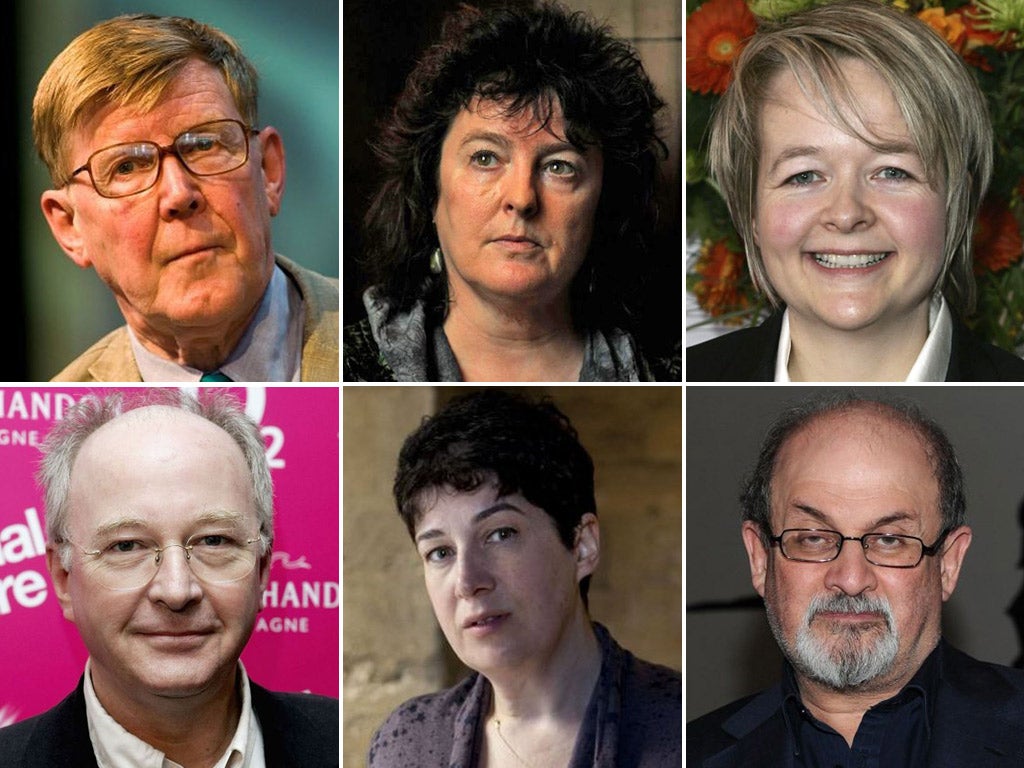Top writers outraged at ban on books for prisoners
Alan Bennett, Sir Salman Rushdie, Ian McEwan, Carol Ann Duffy, Philip Pullman, Irvine Welsh, Nick Hornby and Ian Rankin among signatories to letter condemning policy

Your support helps us to tell the story
From reproductive rights to climate change to Big Tech, The Independent is on the ground when the story is developing. Whether it's investigating the financials of Elon Musk's pro-Trump PAC or producing our latest documentary, 'The A Word', which shines a light on the American women fighting for reproductive rights, we know how important it is to parse out the facts from the messaging.
At such a critical moment in US history, we need reporters on the ground. Your donation allows us to keep sending journalists to speak to both sides of the story.
The Independent is trusted by Americans across the entire political spectrum. And unlike many other quality news outlets, we choose not to lock Americans out of our reporting and analysis with paywalls. We believe quality journalism should be available to everyone, paid for by those who can afford it.
Your support makes all the difference.A coalition of Britain's most eminent writers today condemn the Government's ban on prisoners receiving books in jail, adding to mounting pressure on Justice Secretary Chris Grayling to reverse the policy.
The authors - who include the Poet Laureate, three Booker prize winners and respected playwrights - stage the intervention in a letter published this morning.
The controversial rules prevent inmates from receiving parcels from the outside unless they have “exceptional circumstances” such as a medical condition. Books, subscription magazines and clothing such as spare socks and underwear are all prohibited.
Signatories to the letter include Alan Bennett, Sir Salman Rushdie, Julian Barnes, Ian McEwan, Carol Ann Duffy, Sir David Hare, Mark Haddon, Philip Pullman, Irvine Welsh, Nick Hornby, Ian Rankin, Joanne Harris and Ruth Padel.
The letter, published in the Daily Telegraph, reads: “We are extremely concerned at new rules that ban family and friends sending in books to prisoners. Whilst we understand that prisons must be able to apply incentives to reward good behaviour by prisoners, we do not believe that education and reading should be part of that policy.
”Books represent a lifeline behind bars, a way of nourishing the mind and filling the many hours that prisoners spend locked in their cells. In an environment with no internet access and only limited library facilities, books become all the more important.
“We urge the Lord Chancellor and Secretary of State for Justice, Chris Grayling, to reconsider the Prison Service Instruction that limits books and other essentials being sent to prisoners from family and friends.”
The ban on books being sent to prisoners is part of the Incentives and Earned Privileges scheme, brought in by the Government in November. It allows inmates to earn the right to buy books and other items from approved catalogues based on good behaviour.
The guidelines allow prisoners to borrow books from their library, keeping up to 12 titles in their cell at any one time. However, doubts have been raised over how well the system is working in practice.
In a letter to Inside Time magazine, Nicholas Jordan, an inmate at HMP Oakwood in Staffordshire, wrote: “Some prisoners are saying they can only have 12 books in possession - lucky sods! Here at HMP Oakwood we do not have that luxury. There is no system in place here to purchase books from an approved supplier. We can buy games consoles or DVD players but cannot get books for love nor money. And neither can we have them sent in.
He continued: “The prison library is poorly stocked and trying to order an unstocked title can lead to a three month wait, though you usually get a slip back saying the title is 'unavailable'. I find all this ridiculous, especially if you want to use your time to educate yourself. So much for a 'forward thinking prison'.“
Last night a petition on the change.org website calling for a rethink of the policy had gathered more than 15,000 signatures.
Defending the policy, Mr Grayling said: “The restrictions on access to parcels by prisoners are necessary because of the need to limit the ability of offenders to get hold of drugs and contraband.
“Prisoners have always enjoyed and continue to enjoy full rights of access to all the titles available through the local public library service, which operates a full service in all of our prisons. If titles are not available there and then, they can be ordered as normal.”
David Cameron's official spokesman said yesterday that the Prime Minister fully backed Mr Grayling, but there are signs that the Justice Secretary does not enjoy similar levels of support from others in his party.
One senior Conservative minister told the Daily Mail: “Chris Grayling wins the prize for the Government's least enlightened minister. He has no backing for this from any quarter at all.”
Frances Crook, chief executive of the Howard League for Penal Reform, said: “I hope that the distinguished list of writers and dramatists calling upon the Ministry of Justice to change its mind will persuade ministers to make a U-turn. The Howard League is going to be seeking a meeting with Mr Grayling to see if we can resolve this problem and get prisoners reading.”